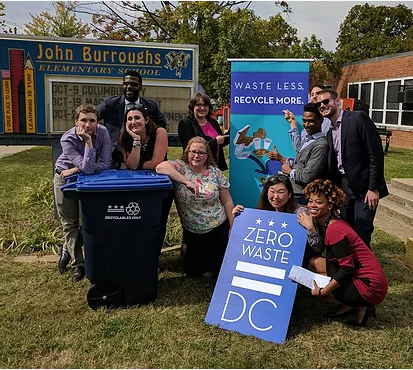Foodservice Packaging Institute’s Efforts Enable Over 7 Million Additional Households to Recycle Cups and Take-out Containers
Communities increase access to expanded acceptance of foodservice packaging in recycling programs through community partnership program
Falls Church, Va. >>> October 18, 2023
The Foodservice Packaging Institute (FPI) encourages the responsible use of all foodservice packaging (FSP) and serves as the voice of the industry representing manufacturers and their raw material and machinery suppliers. Through its efforts in collaborative programs, research, grants and advocacy, the organization has spearheaded the advancement of recycling take-out containers, such as plastic cups and containers, paper cups, paper bags, pizza boxes and aluminum trays.
“Eating out or on-the-go is a regular part of the American culture. Ensuring take-out containers are manufactured responsibly and recovered effectively are priorities to FPI members,” said Natha Dempsey, president of FPI. “That is why we have invested in sustainable, long-term efforts dedicated to quantifying, communicating and improving the recycling of foodservice packaging.”
Community Partnership Program
FPI’s Community Partnership program has helped expand foodservice packaging recycling opportunities to over 7 million additional households since its inception in 2017. The program facilitates engagement between communities, haulers, material recovery facilities (MRFs) and end markets. The goal is to add a suite of foodservice packaging to curbside recycling and/or composting programs.
Partners can include individual communities, multiple communities in a metro or regional area, state agencies, haulers and MRFs. To date, over 24 partners have participated in more than 20 regional areas impacting over 500 individual communities, including:
Athens-Clarke County, GA
Atlanta, GA
Brunswick County, NC
Catawba County, NC
Chattanooga, TN
Chicago, IL
Clark County, IN
Dallas, TX
Dekalb County, GA
Denver, CO
Detroit, MI
East Lansing, MI
Kent County, MI
Lansing, MI
Louisville, KY
Madison, WI
Memphis, TN
Millennium Recycling, SD
New Hanover County, NC
St. Lucie County, FL
Tulsa, OK
Washington, D.C.
“Working with a partner like FPI, we were able to improve the recovery of paper cups and cartons in the communities serviced by Pellitteri Waste Systems,” said David Pellitteri, vice president at Pellitteri. “FPI’s grant and support helped us secure end markets and conduct educational outreach to improve recycling of these materials and keep them out of the landfill.”
The Community Partnership program provides communication grants to help educate residents on how they can recycle items, like cups and take-out containers. Some partners receive equipment grants to help with the sortation of recycled materials. FPI also offers a Resident Education Kit that recycling program coordinators can use in their communications to residents. The kit includes downloadable high-resolution images, customizable flyer templates and best practices available for free to any community.
“Adding materials to the accepted recycling list is no easy feat,” said Kanika Greenlee, Program Management Officer for the City of Atlanta Department of Public Works Office of Solid Waste Services. “Collaborating with FPI empowered Atlanta to add take-out containers, such as paper cups, to our recycling program. This was achieved through engagement with the material recovery facility and regional end markets to ensure a path for collected materials to be made into new products. Additionally, the FPI team supported efforts to educate the nearly 100,000 households we serve to recycle right.”
Industry Advocacy
In addition to the Community Partnership program, FPI is actively working with multiple recycling stakeholders to advance the discussion and acceptance around FSP recovery and to advocate for the inclusion of foodservice items in appropriate recovery streams.
End market outreach and testing led to a joint mill statement on paper cup acceptance with end markets representing well over 75% of the U.S. and Canadian mixed paper market.
FPI has sponsored research including bale audits, material flow studies, residue research, resident messaging and more.
FPI and its paper mill members have developed and proposed a recovered bale specification for post-consumer polycoated paper cups and food and beverage cartons. This grade would formalize a type of polycoated paper bale which is currently being traded as a mill spec bale.
“We are proud of the efforts our team, members, industry collaborators and community partners have made to increase recovery of foodservice packaging,” said Dempsey. “Their dedication and passion to ensure we continue to make responsible and sustainable choices enables FPI to continue to make an impact in communities, economics and the environment.”
More information on FPI’s recovery efforts, studies and education resources can be found at www.RecycleFSP.org.




